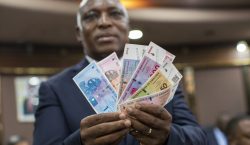

IN late 2016, as Donald Trump was readying to move into the White House, Elliott Broidy, then one of the Republican Party’s top fundraisers, was working on a deal to gain control of what a business partner called “billions of dollars in oil & gas, and mining assets” in Angola.
And while he was trying to pull together this gigantic venture—as well as mounting another project to provide intelligence services to the Angolan government—Broidy used his clout to hook up top Angolan government officials with members of the US Congress and the Trump administration. It was a swampy endeavor involving old-fashioned political influence, a Beverly Hills activist and realtor, and a Nigerian American businessman who had been a close friend of Michael Jackson.
Broidy is no longer a power player wielding sway in the Republican cosmos. Early this year, he faced a series of media stories that raised questions about his business dealings (which included ventures with the governments of Saudi Arabia, the United Arab Emirates, Romania, and the Republic of Congo) and alleged influence peddling. Those articles were based on emails hacked from his personal accounts. Broidy subsequently sued Qatar, claiming Qatari officials orchestrated the hacks and a smear campaign because Broidy, a vigorous supporter of the Israeli government, was a vocal opponent of Qatar.
(In August, a federal judge dismissed the government of Qatar as a defendant in the case.) And in April, news broke that Broidy had in 2017 used Michael Cohen, then Trump’s personal lawyer, to pay $1.6 million in hush money to a Playboy model with whom he had an extramarital affair. Broidy soon resigned as deputy finance chair of the Republican Party. In August, the Washington Post reported he was under federal investigation for possibly selling his influence within the Trump administration to foreign officials for tens of millions of dollars. And recently, federal prosecutors implicated Broidy in a scheme under which millions of dollars ended up in his wife’s law firm in return for Broidy helping a Malaysian financier, who was accused of embezzling billions, end a Justice Department investigation.
The hacked Broidy emails are an incomplete set of records. The hackers obviously disseminated material to cast the businessman/fundraiser in a negative light. But the emails do depict slices of Broidy’s world in which he attempted to grease deals with ties he forged as a top fundraiser for Trump and the Republican Party. And Broidy’s wheeling and dealing in Angola—a full account of which has not yet been reported—reveal how he mixed commerce and politics.
The story begins with an unlikely hook-up: a prominent Beverly Hills resident named Lisa Korbatov brokering a partnership between Broidy and Dolapo Asiru, a Nigerian American dealmaker. On his LinkedIn page, Asiru describes himself as a “highly regarded international investment banker and diplomat” who “has represented African governments at the United Nations and regularly advises other governments on all aspects of their financial planning, investments and international trade.” In 2001, Asiru was sued by Motown for being connected to a company that the record label complained was infringing on its trademark by using the Jackson5.com domain name. (Asiru says that his attorney “not only demonstrated that the action lacked merit, but achieved a confidential and very satisfactory financial settlement in my favor. On a personal note, that frivolous lawsuit never affected my relationship with Michael Jackson who was one of my close friends.”) In 2008, Asiru attended a state dinner at the George W. Bush White House for the president of Ghana. A columnist for Africa News in 2009 called him “one of Nigeria’s most influential men in America.” Asiru, an American citizen, has donated to Republican political candidates, most notably Mitt Romney.
In the latter months of 2016, Lisa Korbatov, a realtor, member of the Beverly Hills school board, and pro-Israel activist, connected Broidy with Asiru, according to sources familiar with the deal. Actually, they already knew each other.
About a decade earlier, Asiru, who had links to the ruling family of Gabon, and Broidy had been involved in a venture in the coastal African country. But that deal—of which there are scant public details—never materialized. “It imploded,” says a former Broidy associate. (The Gabon venture might have ended in a legal fight. In one of the hacked emails, Asiru, writing to Broidy, refers to “litigation with Gabon.”) And around that time, Broidy’s overall dealmaking hit a major roadblock. In 2009, he pleaded guilty to charges he had handed out $1 million in illegal gifts to New York state officials so they would invest $250 million from the state’s pension fund in Broidy’s investment company. (Three years later, after Broidy had cooperated with prosecutors, a federal judge reduced his felony conviction to a misdemeanor.)
Broidy’s involvement in that crime put a crimp in his relationship with Asiru, and by 2016, they were not on the best terms, according to sources familiar with the men. But Asiru had some business prospects he wanted to share with Broidy, and Korbatov, a social acquaintance of both, brought the pair together again. “Elliot wanted to pitch companies in Africa,” a former Broidy associate recalls. (Korbatov and her husband, Igor Korbatov, met Asiru in 2007, when a trust controlled by her parents bought a Beverly Hills mansion from the family of Omar Bongo, the longtime dictator of Gabon. Asiru was then the “managing member” of the limited liability company that officially owned the property for the Bongo family.)